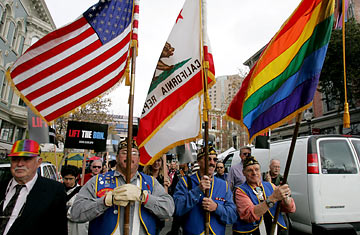
Gay veterans and gay-rights activists hold a parade to honor the contributions of gays and lesbians in the military and to protest the Pentagon's "Don't ask, don't tell" policy
The showdown over "Don't ask, don't tell" begins at high noon on Tuesday on Capitol Hill. Throughout his campaign and during his first year in office, President Barack Obama has declared his opposition to the policy that keeps openly gay people from serving in the U.S. military. He has spent the past year winning the backing of Defense Secretary Robert Gates for a policy change, and more important, the tacit approval of Admiral Mike Mullen, Chairman of the Joint Chiefs of Staff. That's why both men are appearing before the Senate Armed Services Committee to take the tentative first steps toward ending the ban.
Mullen wants the services open to all Americans, "including gays," a Pentagon official says, so long as the military requirement for "good order and discipline" can be maintained. Mullen met with his fellow Joint Chiefs on Monday morning to give them a heads-up about the plan that he and Gates will present to the panel. That marks a significant change from the opposition expressed by General Colin Powell, Mullen's predecessor in the job 17 years ago, when President Bill Clinton failed spectacularly in his bid to end the ban. But gay-rights activists are concerned that opposition from key lawmakers — including Senator John McCain of Arizona, the top Republican on the Armed Services Committee, and Ike Skelton, the Missouri Democrat who chairs the House Armed Services Committee — makes the chances of a repeal dicey.
The ability to scrap the policy — in keeping with Obama's State of the Union pledge last week to do so "this year" — depends on timing. Supporters of the change want it tacked onto the 2011 defense budget bill that will be hammered out in Congress over the coming months, to improve its chances of passing by year's end. "There's been a huge shift in public opinion, particularly among young people," says Aubrey Sarvis, executive director of the Servicemembers Legal Defense Network, a nonprofit group that is working to end the policy. "We think there's an opportunity to do it in this budget over the next 90 days."
Opponents of a change fear an exodus from the ranks if the ban is lifted and want to avoid attaching it to must-pass legislation. "Our service members wear the uniform to fight and win wars, not serve as liberal-social-policy guinea pigs," says Tony Perkins, president of the conservative Family Research Council. "The sexual environment the President is seeking to impose upon the young men and women who serve this country is the antithesis of the successful war-fighting culture, and as such should be rejected."
Until 1993, the President and the Pentagon had the power to keep gays out of the U.S. military. But when Clinton stumbled in trying to repeal that ban unilaterally, seeking scant input from either the military or Congress, lawmakers passed a policy keeping openly gay men and women from serving. So even as the Pentagon prepares to unveil its plan to ease enforcement of "Don't ask, don't tell," the real battle will take place, once again, on Capitol Hill.
Because the Pentagon must obey the policy so long as it is on the books, Gates and Mullen will try to reduce its impact. Pentagon and congressional officials expect them to make it tougher to launch investigations of allegedly gay troops, restricting probes instigated by third parties or spurned partners. Decisions to kick out gay troops will have to be approved by senior commanders, possibly reducing such discharges. "Depending on how it's implemented, the executive action taken by the President could be seismic," said Aaron Belkin, director of the Palm Center, a think tank at the University of California, Santa Barbara, that studies gender issues in the military. The Pentagon will also announce the creation of a civilian-military task force that may survey troops about their attitudes on serving alongside gays, as well as preparing the way for the possible overturning of the policy.
Roughly 1,000 men and women — including some with critical skills like the ability to speak and translate Arabic — are booted from the military each year for being gay. If the ban is lifted, the best the U.S. military can hope for is a replay of the Cold War. For decades, the U.S. military said the Soviet military machine was an overwhelming juggernaut manned with 10-ft.-tall troops. The Pentagon, knowing exaggerating the threat would lead to increased budgets, began publishing Soviet Military Power in the 1980s to highlight Moscow's huge and growing fleets of deadly weapons. But following the collapse of the Soviet Union, it became clear that the red threat had been vastly hyped. There's at least an equal chance that if "Don't ask, don't tell" joins the Soviet Union on the ash heap of history, the fears of allowing openly gay men and women to serve in uniform will prove to have been just as inflated.
